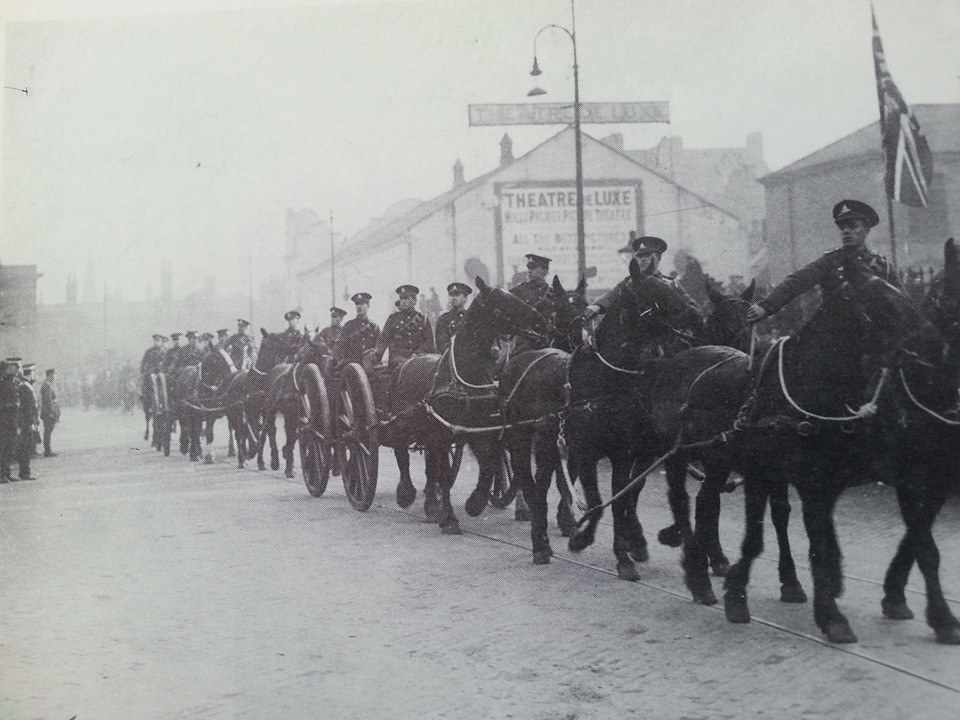
The 8th West Yorkshires Roving back from the Front Line after they had captured the Montaigne de Bligny, 29 July…


marching to the trenches; near Doullens, 28th June 1916

East Yorkshire Regiment going up to the line near Frezenberg during the Third Battle of Ypres, 1917
The Kingston upon Hull Memorial remembers the 7,500 men from Hull, who died in the First World War
This 'digital' memorial lists all the Hull men who died in the First World War and where they lived in the City. It has taken 30 years to research and is the definitive database of Hull casualties in World War One. You can search the memorial by name, rank, regiment, age, date of death, place of burial, and home address. All names are linked to a 'Street Memorial', and a satellite map which shows the street where they lived. Every day the site will show the names of the Hull men, who died in the First World War, on this day.
It remembers over 7,000 Hull men that died in the War who were born in Hull, lived in Hull and were buried in the City. It also includes details of another 2,000 men who died from nearby towns and villages that enlisted in Hull, or were associated with the City. It records the names of oversea sailors, lost on Hull ships, so that their sacrifice is remembered too. There is also a full list of all Hull's civilian casualties, killed in Zeppelin air raids, during the First World War.
The Hull Memorial is inter active. You can search for Hull relatives lost in the 'Great War', or find out who died from your Street in Hull. Discover Hull in the First World War, or learn more about the Great War itself. Also, add your own family stories and photographs, to make the Hull Memorial comprehensive, interesting and up to date. The Hull Memorial is 'on line', accessible and free to use. It belongs to the people of Hull.
Hull in the First World War
During 1914 -18, Hull citizens joined up in large numbers. Over 75,000 people served, and some 30% were to become casualties. Hull raised four 'Pal' Battalions for the East Yorkshire Regiment, which was more than many other larger Cities. It formed an additional 5th 'Cyclist' Battalion, and a Railway 'Pals' Battalion, known as the 17th Northumberland Fusiliers. Hull created other voluntary reserve Units, which the City paid for and equipped itself. It was one of the first to develop an Anti Aircraft unit and had its own Army Service Corp.
Hull supplied Britain with modern trawlers and skillful mariners to safeguard the seas. The City at a time of severe shortages built a remarkable 40 ships during the war, and supplied the nation with vital food and raw materials. Hull lost nearly 130 ships and over 1,200 sailors during the First World War.
Hull created a unique force of 3,000 'Special Constables', to guard the City and its ports. Hull was known as the 'Home to Blighty', receiving some 80,000 repatriated Prisoners of War through its ports. Hull established medical units and new hospitals, and had one of Britain's most successful Recruiting Offices, at Hull City Hall. Hull formed a Special Garrison of Artillery, made up of local Policemen, to specifically guard the Humber Estuary. The City suffered eight bombing raids by enemy Zeppelins and was home to the British Spy, Max Schultz.
As the war ended, Hull established a unique charity, known as the 'Great War Civic Trust'. This helped Hull's 20,000 wounded and their dependents for the next 65 years. Hull adapted its industries and workforce to help win the war. Hull women proved indispensable in maintaining home life, in the face of great hardship and tragedy.
Hull has a unique story to tell during the First World War. It is time to remember Hull's history, 100 years on from the start of World War One, and as Hull becomes the City of Culture in 2017.
This website is constantly under development.
22nd January 2026
On this day we remember…
- 1915 G. Sharp
- 1915 George Harold Duffill
- 1917 Paul Wilson
- 1918 Harry Cecil Morris
- 1918 Herbert Isaac Readman
- 1919 Harry Herbert Hoodless
- 1919 Alfred Dillon
- 1920 William Herbert Ransom